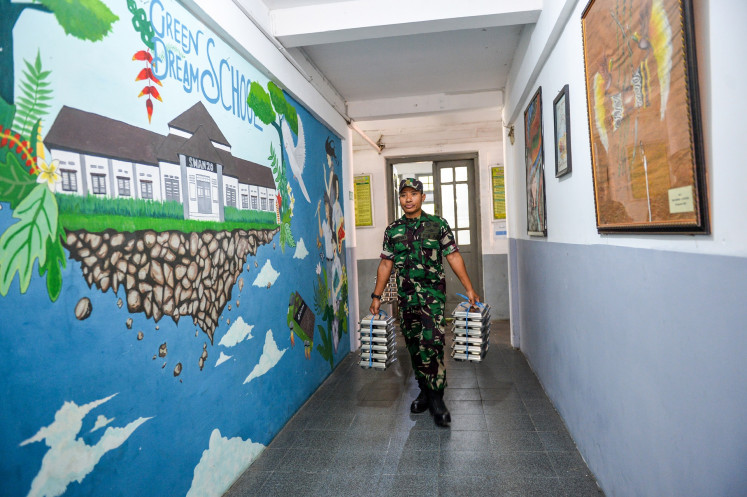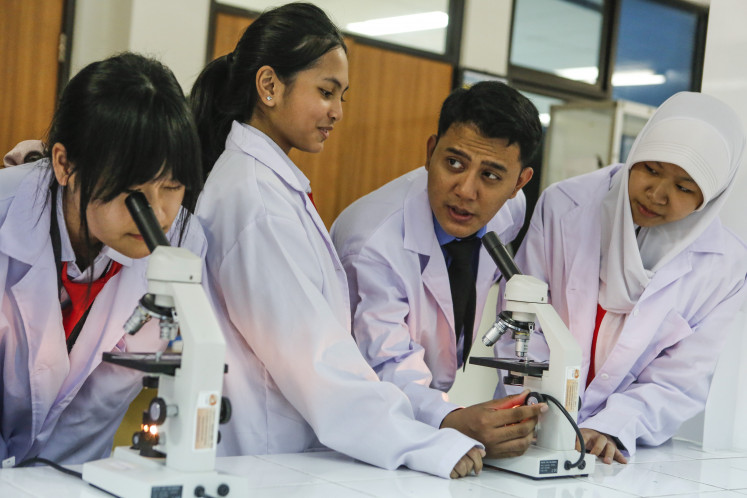Popular Reads
Top Results
Can't find what you're looking for?
View all search resultsPopular Reads
Top Results
Can't find what you're looking for?
View all search resultsGetting Indonesian management in shipshape
(Courtesy of IMD)With healthy 6
Change text size
Gift Premium Articles
to Anyone
(Courtesy of IMD)With healthy 6.5 percent economic growth despite the global economic crisis, Indonesia has become one of the world's celebrated seven emerging markets in the acronym-defined MIT (Mexico, Indonesia, Turkey) and BRIC (Brazil, Russia, India and China).
Experts say there is no room for complacency and still much to be done for improvement in the area of business competitiveness to bring it on par with other nations.
The president of Swiss-based business learning institute IMD, Dominique Turpin, shared his insight on management, the importance of branding and the life-long learning process during a recent visit to Jakarta.
Deal with corruption
According to Turpin, Indonesia has to counter the biggest challenges of infrastructure, corruption and bribery, all of which affect its competitiveness level. 'If you improve the infrastructure and eradicate corruption, the cost of doing business will be lower and Indonesia will have more competitiveness in business,' he said.
He underscored the need to tackle corruption. Indonesia ranks 140th on the Transparency International survey, and finished bottom in a similar survey on transparency held by IMD.
'The corruption issue needs to be addressed. Only Indonesians can solve corruption,' he said.
Improve the education level
Turpin believes manager capability in Indonesia needs to be upgraded. While Indonesia has many higher learning institutions, the issue is not about quantity but quality of education.
'You have to provide better training for the professors. Another way is to consolidate. You have many schools, so the best way is probably to merge a few universities and reform so that the money really goes to education,' he said.
He explained that 50 percent of what people learn might come from professors but the other 50 percent comes from other people in the same room. Therefore, he added, it was important for businesspeople to be surrounded by people from other countries to learn what was going on in their parts of the world.
'We have opened an office in Singapore. We hope to attract executives from the neighboring countries. We'd like to see more Indonesians coming to our courses. We have 8,000 people from all around the world and only 4 percent are Swiss,' he said.
Get out of the comfort zone
Turpin notes that Indonesians tend to be comfortable with their position in life and the status quo. He added that the same thing was also found in Thailand where it was difficult to find Thais who want to work abroad.
'If it's comfortable then the learning curve will not increase,' he said.
He encouraged Indonesian businesspeople to invest not only locally but also regionally in Malaysia and Thailand.
'You have to be strong locally, but also must be strong regionally. If you are not strong enough, the foreigners will come and take over the companies,' he said.
Grow the entrepreneurial spirit
One of Turpin's tips to get out of the comfort zone is by boosting the spirit of entrepreneurship. He said the autobiographies of successful businesspeople showed the secret to success is that people only need have a simple idea and can make it happen.
He lamented the fact that Indonesia had yet to have a brand that went global.
'If you want to take Indonesian brands global, you need to invest the money in marketing. Take the example of Havaianas, a brand of flip flop from Brazil. It's a simple product but they spend money on marketing. Taking risks is part of entrepreneurship,' he said.
'Every problem in life is a business opportunity. In order to be successful, you need to take some risks.'
Focus on what matters
Turpin said that the way people did business in east and west was 90 percent the same and the difference was usually in the culture. However, he added, sometimes people devoted too much energy to dealing with the 10 percent.
'Find the good common sense between Indonesian, Canadian and French. Marketing is marketing, finance is finance. We all want good food, health, education, better life for children. What culture doesn't want that?' he said.
Nurture the curious in you
There are people who are naturally curious, but there are people who prefer to stay at home, watch the same show and eat the same food. Turpin, a longtime resident of Japan, suggested that Indonesian parents take their children on trips to other provinces to enable them to learn, to appreciate the nation's diversity and grow curious about their surroundings.
He believes that once curiosity had become second nature, the children would enjoy the life-long learning process.
'In every country or place you go, you can meet interesting people and hear their story. If I can take a break for one year, I will spend it traveling,' he said.
'When I lived in Japan, I realize that every culture has something my native culture doesn't have. I became less judgmental. [Through travel] '¦ you will understand that every culture has pluses and minuses and you will feel richer inside.'










